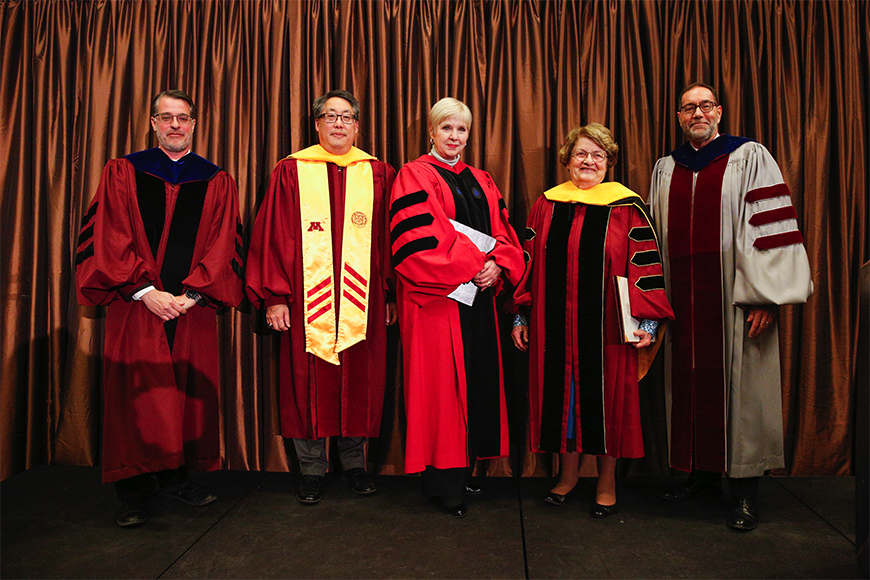Honoring Distinguished Economist Anne O. Krueger
Renowned scholar Anne Krueger, who has held top economic posts at the World Bank and International Monetary Fund, in November returned to her one-time academic home at the University of Minnesota. A specialist in international commerce, Krueger taught at the university from 1959 through 1982. On her latest visit, she received an Honorary Doctor of Science Degree for her considerable contributions to her field.
Krueger joked about getting lost on her old campus but turned serious about the United States getting lost in a trade fight that portends more losers than winners.
After 70 years of world trade agreements that have spurred unprecedented economic growth, created millions of jobs and lifted entire nations about of poverty, the Trump White House has embarked on a go-it-alone approach that threatens to turn back history, economist Anne Krueger cautioned in a speech at the University of Minnesota.
A quota on steel imports from South Korea – and a 25 percent tariff on steel from other nations – will have consequences that lead to the opposite of what Americans have been promised by the Trump administration, Krueger said. Her vision of what is to come:
Instead of creating jobs, whatever jobs in the U.S. steel industry are shielded from foreign competition will be hugely outnumbered in job losses among U.S. firms that rely on steel to make their products.
Some 145,000 U.S. workers are employed by steel companies. But 16 times that number work for companies that use steel for parts or raw materials. In 2002, when the George W. Bush administration moved to reduce steel imports, the action proved to be a job market calamity. A study later showed U.S. steel companies hired 6,000 workers thanks to the steel import restraints. But 200,000 workers at steel-using companies lost their jobs thanks to soaring steel prices.
“According to that estimate, of course, more jobs were lost in steel-using industries than the total employed in steel-making industries,” Krueger said.
Instead of strengthening the U.S. steel industry, tariffs and quotas are likely to make foreign rivals more profitable and better able to spend on new products and more efficient factories.
Tariffs are collected by the U.S. government, although most are passed along to consumers in the form of higher prices. Quotas allow foreign companies to raise the price of their exported goods and keep every penny of higher prices for themselves.
“When it goes to producers abroad, their profits go up,” Krueger said. “And when their profits go up, they can reinvest more.”
Only a couple of months after the White House imposed new trade barriers on steel, the price of a ton of U.S.-made steel soared to nearly $750. European steel was priced at about $400 a ton.
“What do you think that (European cost advantage) does to the competitive position of steel users, such as autos, farm machinery, mechanical equipment and much more?”
Instead of reducing the size of government, steel trade barriers have created a fast-growing bureaucratic thicket in international commerce that will cost taxpayers – as well as importers and exporters – millions of dollars to navigate.
For instance, U.S. steel importers are permitted to ask for “waivers” on limits to South Korean steel imports or tariffs on other foreign steel. Government officials said they anticipated about 4,500 such requests. As of Nov. 1, they were inundated with 75,446 appeals for import exemptions.
The paperwork appears likely only to become more daunting.
South Korea alone makes 54 categories of steel subject to quotas. Each type of steel comes with a 10-digit product code and importers are required to provide details on the chemical composition, strength and dimensions of the metals they make.
Not only that, but all steel imports will have to be inspected to ensure they aren’t subject to import barriers – or that third-party countries aren’t sneaking in steel they bought from South Korea or other steel makers subject to new U.S. border limits.
“It’s amazing how complicated you can get very quickly,” she said. “Some of those complications are at the crux of what can go wrong.”
The intricacy, Krueger suggested, will create situations just short of comical.
For generations, Americans paid nearly double the world price for sugar, thanks to import quotas. The experience showed how ingenious importers can be to get around trade barriers. Krueger told the tale of a Toronto cake mix maker that years ago routinely shipped to the United States. Ninety-five percent of the “cake mix” was sugar. A Buffalo plant separated the flour from the mix, selling the sugar at a substantial markup.
Gaming the system demands elaborate counter-measures by a force of government watchdogs, a force the U.S. government has only begun to build.
The U.S. Commerce Department already has had to hire 30 steel specialists to examine waiver requests from steel importers – a process that can take weeks or months. The average U.S. steel importer has filed requests for more than three dozen exemptions to Trump’s steel barriers. One company has asked for 1,168.
Moreover, Krueger said the effect of steel import barriers will tend to strengthen big companies at the expense of smaller firms and prop up weak U.S. steelmakers at the expense of rivals with more promise.
How? Giant companies that spend six-to-seven figures on piles of newly required trade paperwork will be spending pocket change compared to smaller companies that could bristle at the high prices of swelling bureaucracy, she said.
At the same time, faltering U.S. steel makers could get a major boost from soaring metals prices thanks to steel import barriers – taking up space in the marketplace that might otherwise have been filled by more efficient, up-and-coming competitors.
If all the consequences of steel import barriers appear overwhelming, Krueger adds another.
U.S. importers of South Korean steel learned that the new quota – which cuts imports from that country by more than 30 percent – meaning some quotas already reached their limits last summer. Result: American manufacturers had to scramble for an alternative – and higher-priced – steel supplies.
The new trade barriers on South Korean steel imports also set limits on quarterly shipments. That means, Krueger said, that companies with seasonal spikes in demand either have to shut down production without fulfilling all their orders or load up on imported steel inventories to feed factories that won’t need the metal for much of the year.
In the event of a natural disaster, such as a hurricane, builders may go begging for steel because supplies already have been claimed by others.
The damage to trade relations seems likely to grow, as more companies seek protection from foreign rivals and the U.S. government picks and chooses who gets relief and who does not.
“Protection, once started, is like a cancer…” she said.
“It’s to be hoped that the follies of protection soon become sufficiently evident that American policy will revert quickly to support broken multi-lateral trade system and move to strengthen it before more damage is done.”



